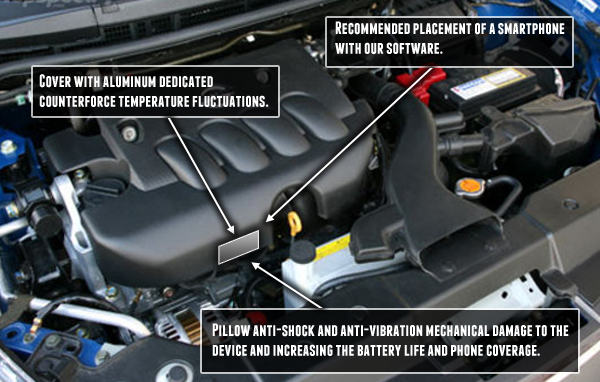
Nissan Versa GPS Tracking
Track your Versa for free and visualize it on map
Produced to:
How to track your favourite Nissan - model Versa in realtime for free ?
Producer remarks about this particular model
Nissan Tiida / Versa - a compact car introduced in 2004 in Japan, started its production there of the same year, and worldwide sales of the model was launched a year later. In Poland, was launched in June 2007 and bore the offer for 2012. In Europe, the model serves as a successor model Almera Generation Nissan Tiida I was sold the aforementioned United States as the Nissan Versa, a sedan in Japan called the Nissan Tiida Latio. There was also a short episode with an attempt to Tiidy sales in South America as a Dodge Trazo.Our product description
We are offering you completely free of charge our GPS car tracking solution in real time. The only thing you need to do is to install smartphone with Android inside your vehicle with our awesome application on board
If you want to track your Nissan Versa in real time you have to do the following :
1. Download Free Car Tracking Application for Versa application from Google Play
2. Create free account on spysat.eu (for example johndoe) - here is detailed instruction
3. Define Device endpoint for each vehicle you want to track - give friendly name of your Versa and PIN (some random will be provided - you can change it if you want)
4. Run SpySat mobile application on the smartphone and type there your LOGIN from SpySat (ex. johndoe) and PIN (from point 3.)
5. Install your smartphone inside the car
6. Enjoy watching position of your car at spysat.eu site.
7. Provide stable power supply - spysat app consumes some energy.
Best options to install smartphone inside Nissan Versa
To permanently mount a smartphone inside your Nissan Versa with a direct connection to the battery and use it as a GPS tracker, follow these steps:1. Choose a mounting bracket that fits your phone size and is compatible with your car's interior.
2. Install the mounting bracket in your preferred location using the provided screws.
3. Connect your phone to the car's USB port or auxiliary input to charge its battery and enable Bluetooth connectivity.
4. Download our free GPS tracking app from our website, which is specifically designed for this purpose.
5. Pair your phone with the app and activate GPS tracking features.
6. Position your phone inside the mounting bracket and ensure it stays securely in place during driving.
7. Enjoy peace of mind knowing that your phone is always connected to the car's battery and can be tracked at any time using our GPS tracking app.
As for maintenance tips, here are a few suggestions:
- Avoid overloading the car or placing heavy objects on the roof rack.
- Regularly check the tire pressure and tread depth to ensure safe driving conditions.
- Keep your car clean and well-maintained to prolong its lifespan.
- If you plan to travel with young children, always secure them using seat belts and child seats.
We hope this helps! Let us know if you have any further questions or concerns.
Users opinions and questions

Installation of smartphone devices running CarTrack allows a special box in which the device is placed and then mounted in the engine in the most accessible place. The design and use of appropriate materials, the device is completely safe. It will not be damaged by mechanical shock, rapid changes in temperature and possible leaks in the engine area. Our engineers have designed anti-shock cushions that firmly secure the car.
Frequently Asked Questions:
What are the maintenance intervals and recommended services for a 2014 Nissan Versa?
Maintenance intervals and recommended services for a 2014 Nissan Versa will be based on mileage as well as time. Here is a general guideline for maintenance:- Every 7,500 miles or annually:
- Tire rotation and balance
- Fluid level check and top-off (engine oil, transmission fluid, brake fluid, power steering fluid, coolant)
- Check and adjust tire pressure
- Inspect lights and wipers
- Inspect air filter
- Every 15,000 miles or annually:
- Replace engine air filter
- Replace cabin air filter (if applicable)
- Brake system inspection
- Every 30,000 miles:
- Replace spark plugs
- Replace fuel filter (if applicable)
- Every 60,000 miles:
- Change engine oil and filter (follow the manufacturer's recommended oil change interval)
- Inspect drive belts and hoses
- Every 120,000 miles or as needed:
- Replace timing belt (consult your vehicle owner manual for specific information about your Nissan Versa)
These are general recommendations. Always refer to the maintenance schedule in your vehicle's owner manual for specific details based on the year, make and model of your car. It’s important to keep up with regular maintenance to ensure your car runs smoothly, safely and efficiently.
Can you explain the benefits of purchasing a new Nissan Versa over its competitors, and what maintenance recommendations do you have for this specific model?
Certainly! The Nissan Versa is an affordable, compact car that offers good fuel efficiency and a spacious interior. Compared to other small cars in its class like the Toyota Yaris or Honda Fit, the Versa has more rear-seat legroom and trunk space, making it a great option for families or people who need extra storage.Some of the features that set the Nissan Versa apart from its competitors include:
1. Affordable pricing: The Versa is one of the most affordable new cars on the market, making it an excellent choice for budget-conscious buyers.
2. Fuel efficiency: The Versa offers impressive fuel economy, with the 2020 model getting up to 32 mpg city and 40 mpg highway.
3. Spacious interior: Despite its small size, the Versa has a surprising amount of interior space, making it comfortable for passengers and easy to fit luggage or other items in the trunk.
4. Standard safety features: The Nissan Versa comes equipped with standard safety features like a rearview camera, automatic emergency braking, and lane departure warning, which are not always standard on competitors.
As for maintenance recommendations for the Nissan Versa, it's important to follow the manufacturer's recommended service schedule. This includes regular oil changes, tire rotations, brake checks, and fluid top-offs. Additionally, it's a good idea to have your car inspected by a professional mechanic every 10,000 miles or so to catch any potential issues before they become major problems.
One maintenance tip specific to the Versa is to pay close attention to the timing belt. The Nissan Versa uses a timing chain, which means you don't have to worry about replacing it like you would with a timing belt. However, it's still important to keep an eye on its condition and have it inspected by a professional if you notice any unusual noises or symptoms.
Can you explain the difference between the engines used in the various model years of the Nissan Versa, and what impact does this have on maintenance needs?
Sure! The Nissan Versa is a subcompact car that has gone through several model years since its introduction. Here are some of the engine options for different model years and their maintenance needs:1. First-generation Versa (2007-2011): The first Versa came with two engine options - a 1.6L and a 1.8L. The 1.6L was available in base models and produced around 105 horsepower, while the 1.8L was found in higher trim levels and had about 122 horsepower.
Maintenance needs for these engines generally include routine oil changes, filter replacements, and spark plug changes at regular intervals. Timing belts should also be replaced around every 60,000 to 100,000 miles depending on the specific model year.
2. Second-generation Versa (2012-2019): The second generation of the Versa came with one engine option - a 1.6L. This engine produced around 109 horsepower and was available in both manual and automatic transmissions.
Maintenance needs for this engine are similar to those of the first-generation engines, including routine oil changes, filter replacements, and spark plug changes at regular intervals. Timing belts should also be replaced around every 60,000 to 100,000 miles depending on the specific model year.
3. Third-generation Versa (2020 - present): The third generation of the Versa came with two engine options - a 1.6L and a 1.5L turbocharged inline-4 engine. The base model comes with a naturally aspirated 1.6L engine that produces around 122 horsepower, while the SR Turbo trim level features the more powerful turbocharged 1.6L engine which generates about 190 horsepower.
Maintenance needs for these engines are similar to those of previous generations, with routine oil changes, filter replacements, and spark plug changes at regular intervals. However, due to the higher power output of the turbocharged engine, it may require more frequent inspection and potential replacement of components such as the turbocharger and intercooler over time.
In summary, while there are some differences in engine options between various model years of the Nissan Versa, maintenance needs generally involve routine preventive measures like oil changes, filter replacements, and spark plug changes at regular intervals. However, some higher-performance engines may require more frequent inspection and potential replacement of certain components over time due to increased wear and tear.
As a Nissan car salesman, how would you explain the benefits of the latest model of the Nissan Versa compared to its competitors in terms of fuel efficiency, safety features and affordability?
Firstly, let me congratulate you on considering the Nissan Versa as your next vehicle. As a Nissan car salesman, I'm delighted to introduce you to our latest model of the Versa, which offers an impressive combination of fuel efficiency, safety features, and affordability compared to its competitors in the market.Let's start with fuel efficiency; the new Versa boasts a fuel economy rating of 32 city/40 highway MPG (miles per gallon) for the S and SV trim levels, making it one of the most efficient vehicles in its class. This translates to significant savings on fuel costs over time, especially if you're a frequent commuter or have long daily drives.
Moving on to safety features, our latest Versa comes equipped with Nissan's Advanced Air Bag System, Vehicle Dynamic Control (VDC), and the Around View Monitor – an advanced 360-degree camera system that helps you navigate tight spots by providing a bird's eye view of your surroundings. In addition to these standard features, higher trims offer more advanced safety technologies such as automatic emergency braking with pedestrian detection, lane departure warning, and rear automatic braking.
As for affordability, the Nissan Versa remains one of the most budget-friendly vehicles in its segment, offering a range of trim levels that cater to different needs without compromising on quality or performance. You can choose between the base S model, the more feature-rich SV, and the top-of-the-line SR – all within an affordable price range compared to other compact cars in the market.
In conclusion, the new Nissan Versa offers a perfect balance of fuel efficiency, safety features, and affordability – making it an excellent choice for anyone looking for a reliable and practical vehicle without breaking the bank.